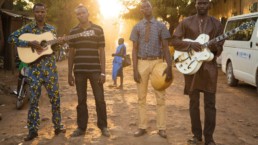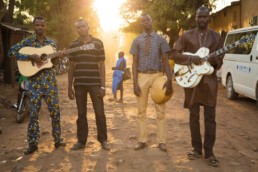‘They Will Have to Kill Us First’ Documents Mali Musicians Fighting Against Oppression
This is a custom heading element.
Taking us into a story that deserves to be heard worldwide yet most certainly hasn’t been circulated, They Will Have to Kill Us First follows four musicians from Mali as a radical separatist organization called the MNLA (National Movement for the Liberation of Azawad) seized the government and steps in proclaiming jihad and in turn banning music of all forms. In a place where radio, wedding singers and even the strum of a guitar are suddenly illegal and punishable by death, these musicians find themselves as rebels fighting back against oppression. One of the musicians describes living without music as “like cutting off oxygen,” and indeed, it’s impossible to imagine what kind of profound effect this would have.
When analyzing a documentary of such important narrative, it’s difficult to separate the technical review from the narrative review. The initial premise outlined above is electric and seems like essential viewing while the film itself simmers much lower than this concept. Juggling between four protagonists, it begins to feel a bit like a documentary that merely follows its subjects rather than asking pertinent questions. Occasionally, the subjects share insights that are truly powerful. For example, one shares the ultimate hypocrisy of the jihad as being a religious struggle when he’s seen soldiers partaking in drugs and alcohol despite their unholy status. This nugget asks the question if these religious “holy wars” may in fact just be masks for obtaining power and control. When 98% of Malian citizens are already Muslim, why does a regime feel the need to claim jihad if not merely for power purposes?
Another powerful moment is when Moussa, a musician that relocates to Burkina Faso to save his life, recognizes that his traditional beard and turban make locals and tourists think he is one of the radicals, and so we see him remove his traditional garb from day-to-day wear. However, every moment as strong as this is accompanied by a series of images that aren’t as insightful or pushing the narrative forward.
With the four protagonists, we get a string of narratives and insights into their lives. Disco shares her unique relationship with her military husband. The Songhoy Blues get put in a conflicted state when they’re able to tour England and make a name for themselves but at the price of leaving their home country that they’re fighting for behind.
These each have their own intriguing pieces and shed light on the situations they find themselves in. Yet the connection of these and the large stakes at hand aren’t always in sync, and sometimes director Johanna Schwartz’s They Will Have to Kill Us First falls more in line of documentation and archive rather than a complete arc of a feature. The climactic concert feels like a missed opportunity to make a profound, emotional statement about the situation. This is a case where the film’s importance is worth noting because of how well this film sheds light onto an otherwise overlooked story but leaves behind some of the craft that could elevate the documentary itself as a piece worth commemorating. In the end, there is much gratitude to be had for any film that is telling important stories the mainstream media has not deemed worthy of airtime.
They Will Have to Kill Us First is now playing at the Laemmle Film Center in Santa Monica with additional markets to follow.
H. Nelson Tracey
Nelson is a film director and editor from Denver based in Los Angeles. In addition to writing for Cinemacy, he has worked on multiple high profile documentaries and curates the YouTube channel "Hint of Film." You can check out more of his work at his website, hnelsontracey.com


